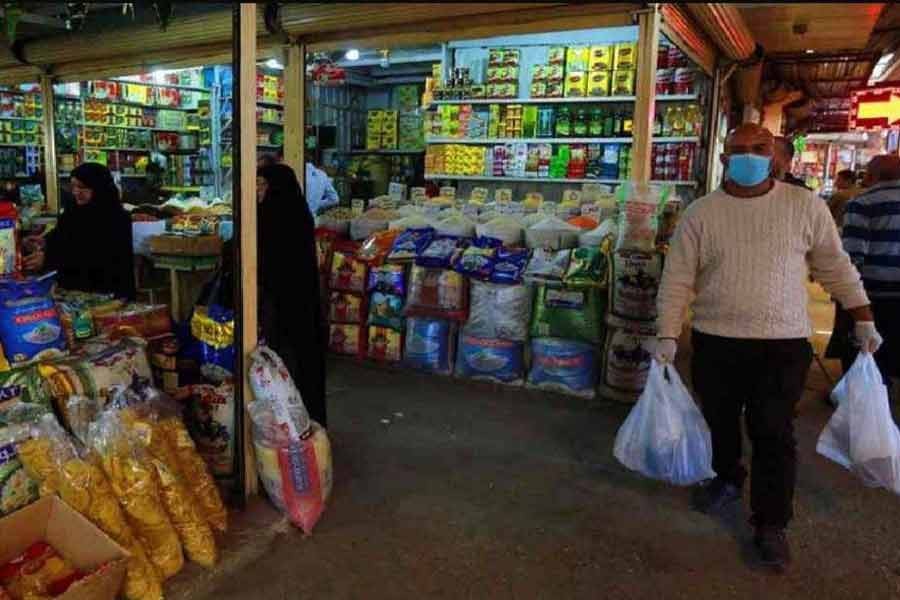The continuous fall of Taka against US dollar as reported from the central bank from time to time is concerning for the common public. Though a linear cause-and-effect relationship does not always work in determining the behaviour of the essentials market, yet the ever-soaring prices of essential commodities point to the existence of some kind of correlation there. And that is more so because, in recent times, most of the nation's staples are being imported from abroad. Since import payments are generally made in US dollar, a hike in dollar's price against Taka is obviously a push-factor for food price inflation. And according to Trading Economics, cost of food in Bangladesh increased 5.43 per cent in November 2021 as against the same (cost of food) in the same month in the previous year. But ominously, there is no end in sight to this growing trend of price hike of essential commodities.
Even if depreciation of Taka against dollar may help export by marking down the price of Bangladeshi products in the international market thereby enhancing its competitiveness, it also makes imported goods costlier. It is worthwhile to note at this point that the economy has been experiencing a higher outflow of hard currency to meet the payment obligation of growing volume of import. In fact, based on the settlement of Letters of Credit (LCs), imports jumped by 53.74 per cent during the July-November period last year costing the foreign reserve to the tune of USD30.23 billion over what it was in the corresponding period a year before (USD19.72 billion). Clearly, it is indicative of a fast growing balance of payment deficit, a situation that economists portrayed at a recent discussion in the city as a reason for concern and advised the government not to allow the situation to go out of control. Notably, the current account deficit now stands at USD 6.0 billion plus during five months of the current fiscal year as against over USD 3.0 billion during the same period a year before.
However, this might not have been an issue to worry about had it also matched the inflow of foreign exchange at least at a comparable, if not at a higher, rate. But the recent trend in the hard currency inflow is rather depressing. Especially, the inward remittance by migrant workers has been declining. Though earnings from the exports have been impressive in the recent months, that could hardly bridge the widening gap in Balance of Payment (BoP).This being an macroeconomic issue, the government is required to step in to manage. But the laypersons, who have to pay through the nose to meet their family expenses cannot wait as their incomes have not increased in the meantime. In that case, how is the government going to address this problem, which is attributable largely to the public's loss of income amid the pandemic? The generous government stimulus money that has gone mainly to the big businesses has not helped the low-income segment of the population. Worse, the benefits of the big stimulus packages the big companies have enjoyed have not trickled down to their low-paid employees. The Readymade Garment (RMG) units may be a case in point. Far from being helped, many of the workers in those factories have faced job cuts, while others had to accept lower pay on the pretext of losses in business. Actually, the support the government extended to the vulnerable section was basically a drop in the ocean. The financial succour in most cases could not finally make it to the intended recipients. But the fact remains that due to data-deficit, wrong address and deliberate attempt by a vested quarter to misdirect the money to their end, the government largesse in many cases could not produce the desired impact. In consequence, a fresh army of new poor joined the ranks of the existing zillions of poor. In fact, rather than breaking the vicious circle of poverty, the trillions of taka worth of cheap, in some cases even free, government money, if anything, has only helped to get the rich richer.
Now, as the economists worldwide are now blaming the rising inflation to the free government money in the market released to bail out businesses and support the unemployed, the unemployed and the poor are now being forced to taste the bitter fruits. In the advanced economies as in the West, the businesses are trying to protect their lowest-paid employees through raising the minimum wage floor. Unfortunately, in Bangladesh the big businesses, let alone the smaller ones, have no such policy to support their low-paid staff even in crisis times. In the absence of strong and proactive labour unions, the government could well come to the rescue of these neglected section of the private sector employees.
But the existing policy being one of promoting business with the hope that it would finally go to help the economic growth, and that is rightly so, the interests of the low-income people have in consequence been put on the back burner. Is it then any surprise that despite the glut of free government money, the poor are being forced to skimp on food and other necessities? The soaring food price inflation has been pushing them to the wall. The government should find some ways to protect the low-paid employees both in the public and the private sector and the low-income people in society against the crushing inflationary pressure.


